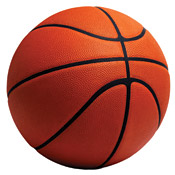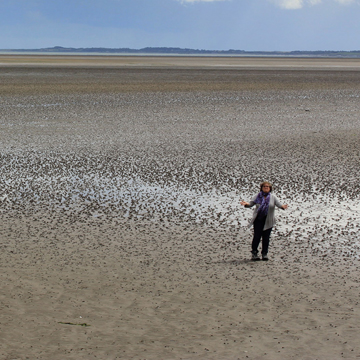Two Can Play at This Game
Category: Features
The 2011-12 NBA season nearly didn’t start at all. Team owners initiated a lockout in July 2011, when the league’s collective bargaining agreement expired. Players and owners had not come to terms on several issues, including the structure of the salary cap—the maximum any team can spend on total player salaries. Finally, late November 2011 brought a tentative agreement—after 161 days—and league play began on Christmas Day.
Two University of Baltimore alumni and NBA executives had courtside seats for the negotiations: Michael Blackstone, M.B.A. ’97, executive director of basketball operations for the Cleveland Cavaliers, and André Walters, J.D. ’05, vice president of legal affairs for the Charlotte Bobcats.
Blackstone joined the Cavaliers in 2010, bringing with him a background in working with sports teams’ front offices to help them improve their negotiation strategies and processes. He came on board as the salary cap administrator just a few months after star forward LeBron James bolted from Cleveland for the Miami Heat. The Cavs finished 13th out of 15 teams in the NBA’s Eastern Conference.
Walters was already on the Cats’ payroll, juggling a mix of legal and other responsibilities, when the lockout began. Despite being owned by retired Chicago Bulls superstar Michael Jordan, Charlotte compiled the worst winning percentage in NBA history: 0.106.
While both teams had disappointing seasons last year, Blackstone and Walters share the athletes’ competitive spirit and are working diligently to help their teams rebound. Here, they reveal their career paths, the best perks for those on the inside and their high points in contract negotiations.

André Walters; photography: Kent Smith
André Walters, J.D. ’05
On wanting to be “like Mike:”
I played basketball and football in high school. As a teenager, I became a Michael Jordan fan, like everyone else. Now I work for him. Life is certainly full of surprises.
On not taking ‘no’ for an answer:
I always wanted to be a lawyer. When I was a kid, I was in an Explorer Program in which you got to shadow an attorney. My TV role model was Clair Huxtable on The Cosby Show. It also helped that my college girlfriend, who is now my wife, wanted to go to law school.
I didn’t get into Baltimore when I initially applied … because I didn’t do that well on the LSAT. But I saw that [UB] was having an orientation session for incoming law students. I decided to attend, and there was the woman who signed my rejection letter.
I had taken the LSAT again and [had] done well the second time, so I went up and spoke to her. She encouraged me to attend [UB’s] Summer Institute [which offers conditional admission] and then apply for reconsideration. I did, and I was accepted.
On turning his love of sports into a career:
[After graduation,] I found a law firm specializing in commercial-lending work that was looking for beginning lawyers. ... The lawyers I worked with there were passionate about their work. I realized that I needed to find something I was passionate about, too, because I knew that was the key to being a great lawyer.
I figured that I was a sports guy; I watch it and talk about it all the time, and I’m fascinated by the sports business. So I began looking for legal work in the sports field.
“That’s the beauty of sports—there’s always next year.”
On landing the job via a case of mistaken identity:
I read that the [Bobcats] had hired Jared Bartie as general counsel. I also saw that he had worked at Black Entertainment Television, where I had interned during law school. I called the team to get his email address but was put right through to his office, and he picked up. It turned out that he was expecting a call from another André about buying a suit. I said, “I’m not that guy, but I’m your guy.” We began talking, and I was hired a few weeks later. Bartie left in 2008, and I was [then] the only lawyer on staff, handling everything. I was promoted to vice president in February 2012.
On the perks of his job:
I get to be a part of the NBA at a very high level. When I watch SportsCenter on ESPN and they’re talking about things I’m involved with, it’s great. I also attend just about every home game, depending on scheduling.
On the highlight of his Bobcats career:
When [General Manager] Rich [Cho] got here, one of the first things we had to do was [help] Bismack Biyombo … get out of a deal with a Spanish team. We were able to get him free of the contract and got him on the court to play preseason games.
On overcoming the Bobcats’ recent disappointing seasons:
The people who work for our organization just don’t have ‘quit’ [in them]. It starts at the top. We all embody the spirit of Michael [Jordan]. He’s a champion, and we believe in his leadership. This season we have new uniforms, a new logo, a new coach and some new players. The experience of what we have gone through as an organization has brought us all closer. That’s the beauty of sports—there’s always next year.

Michael Blackstone; photography: Eric Mull
Michael Blackstone, M.B.A. ’97
On his UB experience:
I got an M.B.A. because I didn’t like my job chasing new business at an insurance company and knew there was something out there that was a better fit for me. I’m not a 9-to-5 guy; I don’t like sitting behind a desk all day, and [I] enjoy an environment where there is a wide variety of responsibilities and opportunities. I had always wanted to go to grad school locally and I heard great things about the program. It was one of the best decisions I ever made.
On finding his way into the sports industry:
[After working] for an advertising agency … and [co-founding] Humagination, a sales training and executive development firm that helped other companies deal with different generations in the workforce, … I joined Shapiro Negotiations Institute. I was put in charge of managing all marketing initiatives and also conducted negotiation-training seminars around the world.
While I was at [Shapiro], I began doing negotiation training and consulting for sports teams’ front offices. We helped them create better negotiation strategies and achieve better results while retaining good relationships with the sports agents. …
When Chris Grant was promoted to [Cavaliers] general manager, he called to see if we could help him find someone to do what I do now. (I’m not a lawyer, so I’m kind of an anomaly in this position.) We sent a couple of people for Chris to interview, but they didn’t work out.
Then Chris … said, “How about you?”... I spoke with Chris and with my wife and family and then figured, why not try a new adventure in a business that I love? Not to mention I knew I would get to be a part of building something great in Cleveland.
“We’re all pretty competitive people. No one wants to be in the middle.”
On his favorite job perk:
The perk is actually the job itself. Building a great team is essential for success in almost every business. But in sports, we are trying to literally build a great team, so it’s incredibly rewarding. I get to work every day at something I absolutely love. I also attend every home game and a few away games. Before I came here, I was traveling all over the world, [so] not having to travel as much is another perk. I also make wonderful connections with people from all walks of life.
On going with the flow:
In general, there is no typical day. I tried my first season to get into a routine, but it doesn’t work. I do try to do anything administrative in the morning so it doesn’t get forgotten. The rest of the day, I end up prioritizing a laundry list of all the things that need to happen.
On the highlight of his Cavaliers career:
[It was] getting the deal done with the Clippers that ended up in us receiving the first pick in the 2011 NBA draft [Kyrie Irving]. It was the first year Chris Grant, David Griffin (vice president of basketball operations) and I were together as a front-office executive team, the first deal we did together and the very first season after LeBron left the Cavs. Being able to get that deal done [under those conditions] was an enormous success.
On rebuilding the team and moving forward:
We’re all pretty competitive people. No one wants to be in the middle. People ask all the time about LeBron and [his] leaving. I wasn’t here during that time, and all I care about is doing my part to help this great team and city get back to an elite winning tradition.
Now we have the opportunity to build something. The question is how you do that the right way. We want to get back on top, but not at the expense of building for the future.

